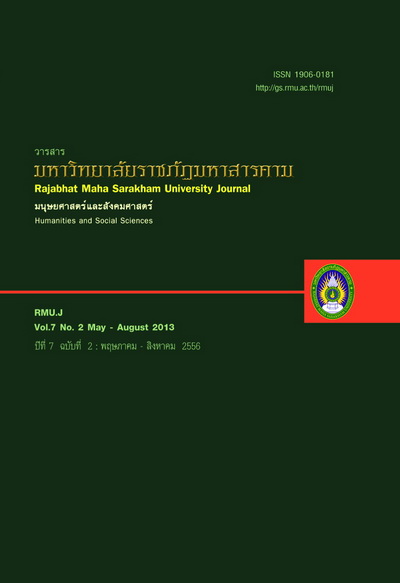ผลการจัดกิจกรรมเสริมประสบการณ์โดยใช้กระบวนการสร้างความคิดรวบยอด ที่มีต่อความสามารถทางคณิตศาสตร์ของเด็กปฐมวัย
Main Article Content
บทคัดย่อ
บทคัดย่อ
การวิจัยครั้งนี้มีวัตถุประสงค์ เพื่อศึกษาจำนวนของเด็กปฐมวัยที่ได้รับการจัดกิจกรรมเสริมประสบการณ์โดยใช้กระบวนการ สร้างความคิดรวบยอดที่มีความสามารถทางคณิตศาสตร์ ผ่านเกณฑ์ร้อยละ 70 ของคะแนนเต็ม และเพื่อเปรียบเทียบความสามารถ ทางคณิตศาสตร์ ของเด็กปฐมวัย ก่อน และ หลังการจัดกิจกรรมเสริมประสบการณ์ โดยใช้กระบวนการสร้างความคิดรวบยอดกลุ่ม ตัวอย่าง เป็นเด็กปฐมวัยชั้นอนุบาลปีที่ 2 ภาคเรียนที่ 2 ปีการศึกษา 2554 โรงเรียนอนุบาลชัยนาท สำนักงานเขตพื้นที่การศึกษา ประถมศึกษาชัยนาท จำนวน 30 คน เป็นการสุ่มแบบกลุ่ม (Cluster random sampling) เครื่องมือที่ใช้ในการวิจัย ได้แก่ แผนการ จัดกิจกรรมเสริมประสบการณ์โดยใช้กระบวนการสร้างความคิดรวบยอด และแบบทดสอบวัดความสามารถทางคณิตศาสตร์ ซึ่งเป็น แบบทดสอบปรนัยมีรูปภาพ 3 ตัวเลือก จำนวน 40 ข้อ มีค่า ความยากง่ายตั้งแต่ 0.33-0.78 มีค่าอำนาจจำแนกตั้งแต่ 0.40-0.85 และ มีค่าความเที่ยงเท่ากับ 0.82 สถิติที่ใช้ในการวิเคราะห์ข้อมูล คือ ร้อยละ ค่าเฉลี่ย ส่วนเบี่ยงเบนมาตรฐาน และสถิติที่ใช้ในการทดสอบ สมมุติฐาน คือ ไคสแควร์ (Chi-square) และการทดสอบค่าที (t-test) แบบ Dependent sample group ผลการวิจัยพบว่า
1. เด็กปฐมวัยร้อยละ 80 ที่ได้รับการจัดกิจกรรมเสริมประสบการณ์โดยใช้กระบวนการสร้างความคิดรวบยอด ที่มีความ สามารถทางคณิตศาสตร์โดยรวมทุกด้าน และแยกเป็นรายด้าน ได้แก่ การจำแนกเปรียบเทียบ การจัดหมวดหมู่ การหาความสัมพันธ์ และการรู้ค่าจำนวน 1-10 ผ่านเกณฑ์ร้อยละ 70 ของคะแนนเต็ม อย่างมีนัยสำคัญทางสถิติที่ระดับ .05
2. เด็กปฐมวัยที่ได้รับการจัดกิจกรรมเสริมประสบการณ์ โดยใช้กระบวนการสร้างความคิดรวบยอดที่มีความสามารถทาง คณิตศาสตร์เฉลี่ยรวมทุกด้าน และแยกเป็นรายด้าน ได้แก่ การจำแนกเปรียบเทียบ การจัดหมวดหมู่ การหาความสัมพันธ์ และการรู้ ค่าจำนวน 1-10 มีคะแนนเฉลี่ยหลังจัดกิจกรรมเสริมประสบการณ์สูงกว่าก่อนจัดกิจกรรมเสริมประสบการณ์อย่างมีนัยสำคัญทางสถิติ ที่ระดับ .01
คำสำคัญ : กระบวนการสร้างความคิดรวบยอด, ความสามารถทางคณิตศาสตร์, การจำแนกเปรียบเทียบ, การจัดหมวดหมู่, การหาความสัมพันธ์, การรู้ค่าจำนวน 1-10
ABSTRACT
The purposes of this research were to study 70 percent of preschool children being taught by the skill improvement activities by using the concept invention process for mathematical abilities pass the standardized criteria and to compare mathematic abilities of the preschool children before and after using the skill improvement activities through the concept invention process. The samples were thirty Kindergarten 2 students in the second semester of academic year 2111 at Chainart Kindergarten School under Chainart Primary Educational Service Area Office. They were selected by the cluster random sampling technique. The instruments used in the research were lesson plans and mathematical skill test with 33-.78 difficulty indices 0.40 to 0.85 discrimination indices and, and 0.8 reliability index. The statistics used in data analysis were percentage, mean, standard deviation, chi-square and t-test (dependent sample group).
The research findings were as follows:
1. The finding showed that 80 percent of preschool children being taught by the skill improvement activities through the concept invention process for mathematical abilities significantly passed the standardized criteria of 70% at the .05 level. The mathematical skills included classification, relational analysis, and knowledge of number one to ten.
2. The mathematical abilities of the preschool children being taught by the skill improvement activities through the concept invention process significantly improved at the .01 level. The abilities were classification, relational analysis, and knowledge of number one to ten.
Keywords : Concept Invention Process, Mathematical Abilities, Classification, Relational Analysis, Knowledge of Number One to Ten Relation, Knowledge Number One to Ten
Article Details
1. บทความที่ลงตีพิมพ์ทุกเรื่องได้รับการตรวจทางวิชาการโดยผู้ประเมินอิสระ ผู้ทรงคุณวุฒิ (Peer Review) สาขาที่เกี่ยวข้อง อย่างน้อย 3 ท่าน ในรูปแบบ Double blind review
2. ข้อคิดเห็นใด ๆ ของบทความที่ลงตีพิมพ์ในวารสารมหาวิทยาลัยราชภัฏมหาสารคาม นี้เป็นของผู้เขียน คณะผู้จัดทำวารสารไม่จำเป็นต้องเห็นด้วย
3. กองบรรณาธิการวารสารมหาวิทยาลัยราชภัฏมหาสารคาม ไม่สงวนสิทธิ์การคัดลอกแต่ให้อ้างอิงแสดงที่มา


